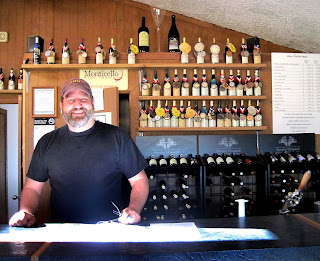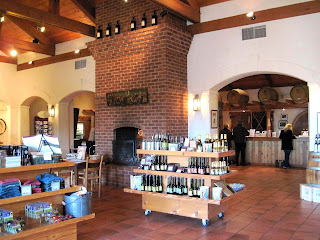
On our way to Stanardsville in January, we visited two area vineyards. Our first stop was Burnley Vineyards, a small, home-grown winery established in 1976, with 32 acres of vineyards, and a tasting room in a converted house. We tasted quite a few of their 15 wines, and settled on a Rubix, a port-style dessert wine. An unusual choice for me, because I’m definitely more of a pre-meal drinker than post-meal. But I enjoyed it enough to consider exploring more dessert wines in the future.

The friendly face at the Burnley tasting room.
After Burnley, we stopped at nearby Barboursville Vineyards, a much bigger operation that includes event space and an upscale restaurant. Like Burnley, the winery was founded in 1976, but historic buildings at the site date back to the early 1800’s. One of the historic homes on the property has been turned into an inn, next to the ruins of the original estate, designed by Thomas Jefferson. History plus wine draws a lot of visitors, and I’ve read that on summer weekends, the tasting room is so crowded that it’s impossible to find comfortable room at the tasting bar. We were there on a dead-of-winter weekday, and were two of only a handful of folks in the large room, so we were able to taste lots of wines in a leisurely way. Barboursville has a wine for every taste, but be careful. When a winery has something like 20 wines available for tasting, you really do need to pace yourself if you expect to drive away safely.

Barboursville’s large tasting room.

The sign at the ruins says: “Historic landmark designed by Thomas Jefferson for Governor James Barbour. Built 1814; destroyed by fire Christmas Day, 1884.”

The 1804 Inn includes this building plus several small restored cottages.






